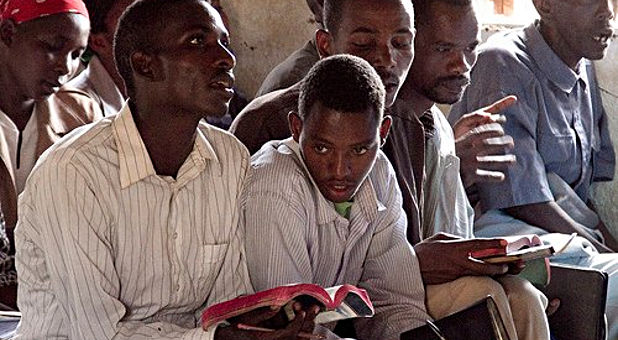Vision 2025 Seeks to Realize Centuries-Old Prophecy
Chances are that if you’re reading this article, then you also have access to a copy of the Bible. Maybe you’ve had a copy your whole life. Odds are that your copy of Scripture is in your own language.
However, there are many people out there who have no access to Scripture in their own tongue. According to a partner of Wycliffe Bible Translators, there are still 1,919 languages awaiting a translation process to begin. The majority—1,576—do not have any known Scripture whatsoever.
These numbers present themselves as a challenge. Wycliffe and many of its partners would like to accept the challenge.
“A few years ago, Wycliffe, along with many of our partners, committed to what we call Vision 2025, and that was to see a Bible translation project in progress in every language needing it by the year 2025,” says Bob Creson, president of Wycliffe Bible Translators.
Their goal to spread the gospel to all peoples of the world corresponds the prophetic Scripture in Matthew 24:14: “And this gospel of the kingdom will be proclaimed throughout the whole world as a testimony to all nations, and then the end will come” (ESV).
“We believe that God is using Wycliffe Bible Translators, along with our partners, to hasten the return of Jesus Christ,” Creson explains.
The work that Wycliffe does elbows perfectly with the work of its partners.
“We’re not church planters, but we know churches are planted as a result of the work that we do,” Creson says. “[So we partner] with other ministries who actually do most of the Scripture engagement activities.”
For individuals to have the gospel in their own tongue is extremely important.
“Our firm belief is that part of God’s mission for Himself and for the communities of the earth is that He wants to invite people into a relationship of reconciliation with Him,” Creson explains. “Our sin created a barrier between us and God. [This] Good News message, this hope that we have in Jesus, is communicated by the gospel message, which is inherent in the Scriptures from the Old Testament clear through to the New Testament.”
Creson says the best way for people to engage in the gospel and react to the truth is to hear it in their mother tongue.
The combined efforts of Wycliffe and its partners have decreased the time it takes to translate Scripture. Technology has also played a large role in increasing the rate. Satellite, covering most of the earth, has provided a much quicker way to check the accuracy of texts right from the field. Computer programs also have aided in shrinking the time. One program uses source texts to predict the translations for related languages.
“When my wife, Dallas, and I joined Wycliffe 30 years ago, the average New Testament took about 20 years to produce,” Creson says. “Today it takes about eight years to produce. Not only are the numbers increasing, but the pace at which we can help communities gain access is also dropping dramatically—the length of time it takes.”
It is reasonable to think the process will only continue to speed up. With just more than 11 years to go, why not consider getting involved?
“People, prayer and finances are the three things that help us advance our cause,” Creson says. “I would just encourage people to prayerfully consider what God might be doing in their own hearts at this point in their lives. We need people who can teach. We need IT people. We need translators. We need literacy people. We need people who teach children’s education in school. We need pilots [and] mechanics.”
Pray for people groups that don’t yet have Scripture. Wycliffe has multiple opportunities where you can help through prayer, on the field or through financial gifts.
This article originally appeared on mnnonline.org.














































